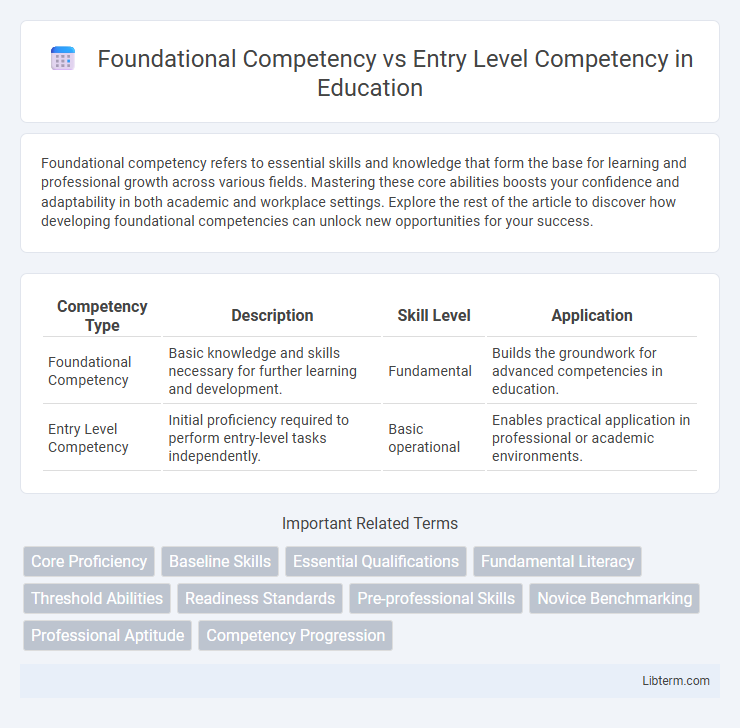Foundational competency refers to essential skills and knowledge that form the base for learning and professional growth across various fields. Mastering these core abilities boosts your confidence and adaptability in both academic and workplace settings. Explore the rest of the article to discover how developing foundational competencies can unlock new opportunities for your success.
Table of Comparison
| Competency Type | Description | Skill Level | Application |
|---|---|---|---|
| Foundational Competency | Basic knowledge and skills necessary for further learning and development. | Fundamental | Builds the groundwork for advanced competencies in education. |
| Entry Level Competency | Initial proficiency required to perform entry-level tasks independently. | Basic operational | Enables practical application in professional or academic environments. |
Understanding Foundational Competency
Foundational competency refers to the essential skills and knowledge that provide the basis for more advanced abilities within a professional or educational context. It includes core capabilities such as critical thinking, communication, and basic technical proficiency that support effective performance across various tasks. Understanding foundational competency is crucial for developing entry-level competency, as it ensures individuals have the necessary groundwork to build specialized skills and adapt to complex responsibilities.
Defining Entry Level Competency
Entry level competency refers to the essential knowledge, skills, and abilities required for an individual to perform basic job functions effectively upon entering a profession. It encompasses fundamental technical skills, basic problem-solving capabilities, and the ability to follow established procedures under supervision. Defining entry level competency involves identifying clear performance standards and measurable criteria that ensure readiness for job responsibilities and support professional growth.
Key Differences Between Foundational and Entry Level Competency
Foundational competency encompasses essential knowledge, skills, and attitudes required to perform basic tasks across various domains, emphasizing broad applicability and adaptability. Entry level competency refers to the specific abilities and proficiencies necessary for initial performance in a particular job or role, focusing on practical, role-related skills. Key differences include foundational competency's general scope versus entry level competency's job-specific focus, as well as the foundational competency's role in preparing individuals for diverse challenges compared to the entry level competency's aim for immediate functional effectiveness.
Importance of Foundational Competencies in Career Development
Foundational competencies such as critical thinking, communication, and emotional intelligence create the essential base for career development, enabling individuals to adapt and excel in diverse professional environments. Unlike entry-level competencies, which target specific job skills, foundational competencies enhance overall learning agility and problem-solving capabilities crucial for long-term career growth. Investing in foundational competencies increases employability, leadership potential, and the ability to navigate complex workplace challenges effectively.
Role of Entry Level Competencies in Employment
Entry level competencies serve as the essential skills and knowledge required for new employees to perform basic tasks and adapt to workplace expectations effectively. These competencies include fundamental technical abilities, communication skills, and problem-solving techniques that enable smooth integration into organizational workflows. Employers prioritize entry level competencies to ensure candidates can contribute reliably from the outset while building upon foundational competencies for long-term career growth.
Foundational Competencies Across Various Industries
Foundational competencies encompass essential skills such as communication, problem-solving, and adaptability that are crucial across various industries including healthcare, technology, and finance. These competencies serve as the building blocks for higher-level job performance, enabling employees to effectively navigate workplace challenges and collaborate across diverse teams. Organizations prioritize foundational skills to foster employee development and enhance overall productivity in dynamic business environments.
How Entry Level Competencies Shape Professional Growth
Entry Level Competencies provide the essential skills and knowledge that form the groundwork for continuous professional development and advanced expertise. Mastery of these competencies enables individuals to effectively navigate early career challenges, build confidence, and contribute meaningfully to organizational goals. Fostering growth through targeted training and real-world application, Entry Level Competencies act as a critical launchpad for evolving into Foundational Competency and beyond.
Assessing and Measuring Competencies
Assessing foundational competency involves evaluating core skills and knowledge essential for job roles, typically through standardized tests, practical demonstrations, and behavioral interviews that ensure baseline proficiency. Entry-level competency measurement focuses on verifying the candidate's readiness to perform specific tasks, often using simulation exercises, on-the-job assessments, and competency-based interviews tailored to beginner roles. Accurate measurement requires aligning assessment tools with predefined competency frameworks to capture both foundational understanding and practical application effectively.
Building Foundational Skills for Future Success
Building foundational skills establishes essential knowledge and abilities that support advanced learning and career growth, forming the cornerstone of future success. Entry-level competency represents the initial application of these foundational skills in practical, real-world tasks, demonstrating readiness for professional challenges. Mastering foundational competencies ensures a sustainable skill set that evolves with industry demands, enabling ongoing development beyond entry-level positions.
Strategies for Developing Entry Level Competencies
Developing entry-level competencies requires targeted strategies such as structured training programs, mentorship opportunities, and hands-on experience to bridge the gap from foundational knowledge. Incorporating real-world scenarios and continuous feedback enhances skill acquisition and prepares individuals for job-specific demands. Emphasizing practical application alongside theoretical understanding ensures a comprehensive pathway from foundational competency to entry-level proficiency.
Foundational Competency Infographic

 libterm.com
libterm.com